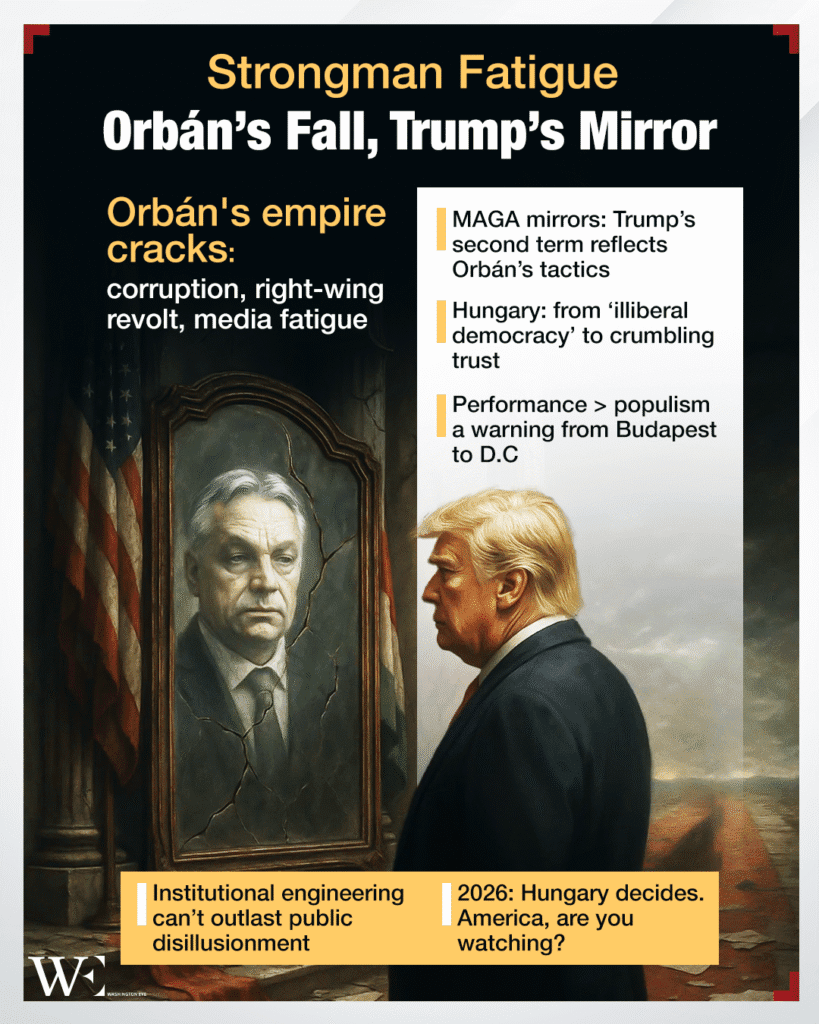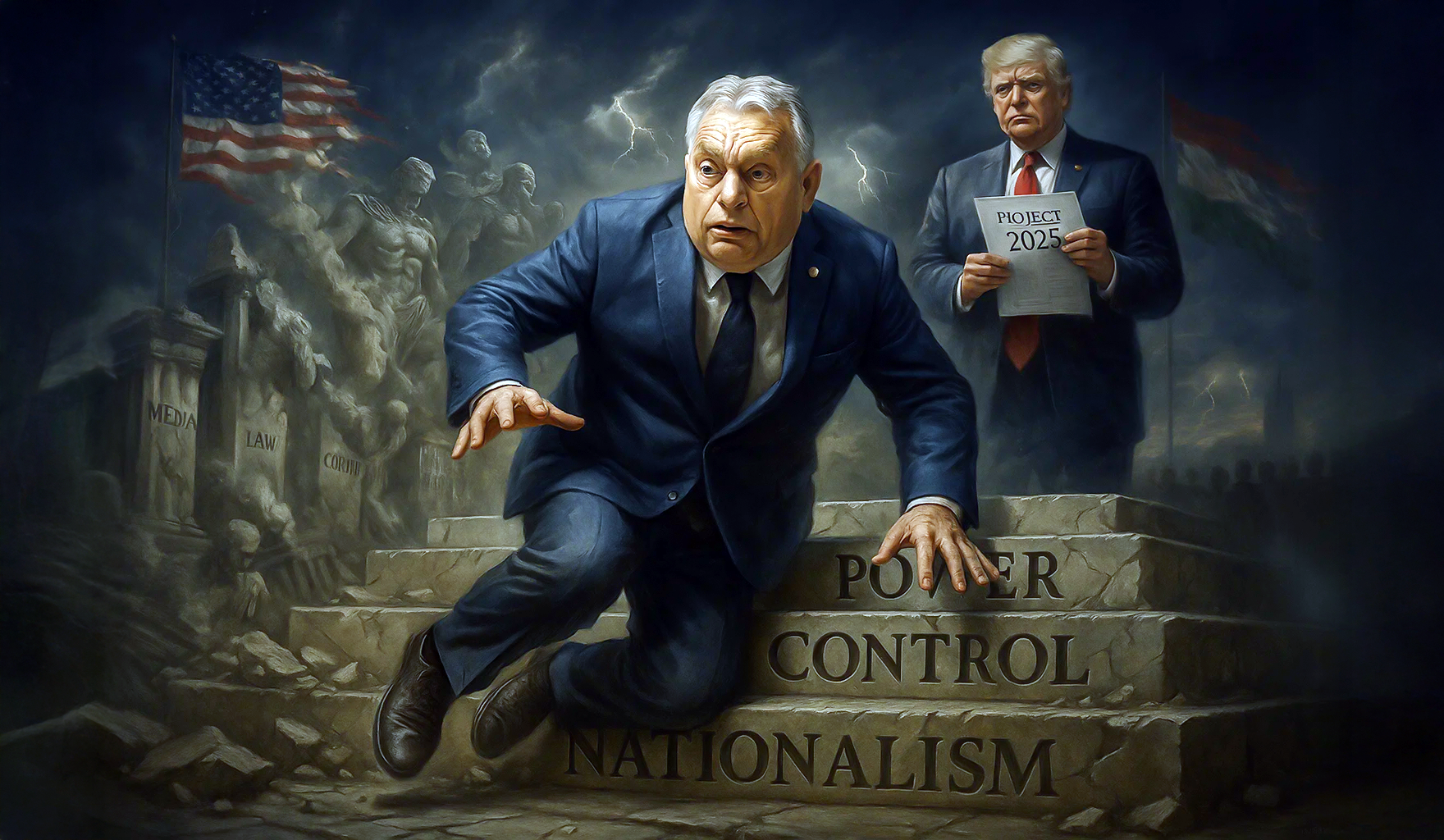In the heart of Central Europe, Viktor Orbán’s once-unassailable grip on Hungary is showing visible cracks. After 15 years of dominance built on nationalism, culture wars, and institutional control, his political machine is stalling—challenged not by the liberal left, but by a disillusioned center-right revolt. For U.S. President Donald Trump, now beginning his second term, the unraveling of Orbán’s power offers a striking case study in the long-term risks of strongman populism.
Trump has long admired Orbán, calling him “a smart guy” and “a tough person” in 2024, praising his governance style and nationalist rhetoric. Orbán, in turn, has been a lodestar for MAGA Republicans—a model of how to bend liberal democracy without formally breaking it. But as Hungary’s political tides shift and Orbán faces a serious electoral threat, the durability of this model is in question. And with Trump’s renewed efforts to consolidate executive authority, gut federal agencies, and reignite culture wars, the lesson from Budapest is one America should take seriously.
From Illiberal Democracy to Political Vulnerability
Orbán’s brand of “illiberal democracy” was once hailed by right-wing figures globally. Combining border crackdowns, state-backed culture war narratives, and electoral engineering, Orbán painted himself as the champion of “Christian liberty” and “sovereign Hungary.” He built a media echo chamber, stacked the judiciary, and rewrote electoral laws to reward his ruling Fidesz party, according to BBC.
Trump’s own playbook has mirrored this model closely: his first term witnessed attacks on press freedom, legal attempts to reshape the judiciary, and calls for election overhauls. His second term is already featuring moves to dismantle civil service protections and to use the federal government more aggressively against ideological adversaries—tactics echoing Orbán’s governance style.
But Orbán’s control is faltering. A corruption scandal involving a presidential pardon over a child sex abuse cover-up triggered the resignation of both Hungary’s president and justice minister. The backlash catalyzed Peter Magyar, a former insider, into a powerful challenger with mass appeal. Magyar’s message—that Hungary is collapsing under nepotism, dysfunction, and state decay—has resonated. In national polls, his new party, Tisza, now leads Fidesz by margins of 9% to 18%.
The Specter of Internal Revolt
What makes Orbán’s current troubles especially instructive for the United States is that they stem not from liberal opposition, but internal rupture. The right-of-center revolt represents a crisis of legitimacy from within the conservative camp itself. This is a pattern Trump may also face. While Trump commands fierce loyalty from his MAGA base, some institutional Republicans remain uneasy about the centralization of power and the long-term damage to democratic norms.
The example of Orbán suggests that power rooted in grievance politics can fracture when performance falters. In Hungary, decaying public services—state hospitals, railways, and schools—have become potent symbols of state failure. Trump, whose second-term agenda is long on retribution and short on policy depth, may also discover that voters eventually demand more than ideological spectacle.
Media Control, Fear Politics, and Cultural War Fatigue
Orbán’s method of governing has relied on weaponizing fear—immigration, national decline, and liberal Europe have all served as convenient targets. He tied general elections to referenda on so-called “child protection,” and leaned into anti-Ukraine sentiment to portray himself as the “peace” candidate in a volatile geopolitical landscape.
Trump’s own culture war agenda echoes these tactics: battles over education, crime, and diversity programs have become front-line political issues in place of substantive economic or healthcare reforms. Like Orbán, Trump positions himself as the defender of traditional values against an alleged cultural and institutional takeover by elites.
But culture war fatigue is setting in—at least in Hungary. Orbán’s narrative, once tightly controlled through state-backed media and opinion polling, may no longer hold the persuasive power it once did. Similarly, in the U.S., repeated moral panics may lose traction if everyday concerns—like healthcare, infrastructure, and wages—continue to be overshadowed by symbolic battles.
Institutional Engineering Can’t Contain Public Sentiment Forever
One of Orbán’s strategic moves was rewriting Hungary’s electoral laws to maximize his party’s seat share with a plurality of votes. This “winner takes all” system—abandoning proportional representation—ensured Fidesz dominance for over a decade. Trump and his allies, especially through the Heritage Foundation’s “Project 2025”, have laid out similar plans to reshape American government by overhauling hiring systems, weakening independent agencies, and expanding presidential control.
But as Orbán’s case shows, institutional manipulation is not invincible. When social trust erodes and internal rivals rise, even rigged systems wobble. Orbán is now losing control of the narrative and—potentially—the machinery of power itself. If Trump ignores similar fault lines in U.S. democracy, his hold could prove more fragile than his loyalist base suggests.
The Endgame: A Struggle for Legitimacy, Not Just Power
Political analyst Zoltan Kiszelly, aligned with Fidesz, admits that Orbán’s core electorate—roughly two million voters—is no longer enough. This leaves Hungary’s 2026 election in the hands of swing voters. The outcome will determine whether the country drifts further toward authoritarianism or pivots toward democratic renewal.
In the U.S., Trump’s approval hovers around 40–45% depending on the poll, with large swaths of the public deeply skeptical of his governing style. That too suggests a precarious balancing act. Like Orbán, Trump is strong but not unassailable. His ability to govern effectively may depend less on loyalty than on whether his brand of strongman politics continues to deliver—or begins to decay under its own contradictions.
A Final Note: Lessons from Budapest to Washington
Viktor Orbán’s struggle to maintain control after years of ruling through fear, polarization, and structural manipulation is a sobering parallel to Trump’s second term. While authoritarian-leaning leaders often seem untouchable, political gravity still applies. Corruption scandals, poor governance, and internal backlash can shake even the most carefully constructed populist regimes.
For Trump, the mirror is clear: admiration for Orbán may continue, but so too should awareness of how easily strongman politics can collapse once the public—and even allies—lose faith. Power rooted in division eventually runs out of space to grow.

















